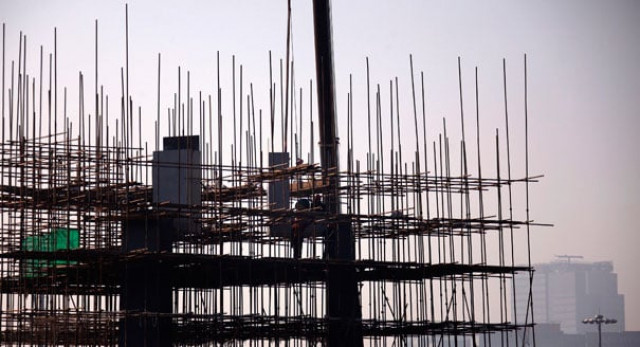Real estate: Construction industry eyes low-cost housing
New govt housing project capable of being the growth engine for the sector.

Private contractors have already chalked out a plan for the execution of the project, which will allow them to construct 100,000 housing units per year for five years. PHOTO: REUTERS
The housing sector in Pakistan is underperforming, primarily due to the reduced government attention in the sector, specifically the lack of urgency in pushing banks to issue soft mortgage loans for the low end segment.
However the announcement made by the government in the recent budget to construct 0.5 million housing units for middle and low income groups creates hope within the construction industry that the plan, if executed, will bring a rapid change in the current deteriorating economic scenario by adding jobs, and increasing production in allied industries like cement, steel and paint.
The construction sector will be the main stakeholder in the execution of this project since the Ministry of Housing and Works alone cannot handle this entirely. Private contractors have already chalked out a plan for the execution of the project, which will allow them to construct 100,000 housing units per year for five years.

“We already made two models for the execution of this mega project. One model is if the government provides land to private developers and constructors at market price through a transparent mechanism with time-bound conditions to develop the housing and sale at pre-determined prices under the supervision of the Ministry of Housing and Works. The second, if the government facilitates private contractors, like providing better infrastructure and by removing official bottlenecks within the departments,” said Akbar Sheikh, Regional Chairman Association of Builders and Developers (ABAD), North region while talking to The Express Tribune.
The Pakistani housing market requires one million units yearly to meet growing demands, but currently only 0.3-0.35 million units are being delivered. The main reason for this is that around 80% of demand of housing units is for low cost housing units, which private developers hesitate to construct due to smaller profit margins. Sheikh believes that this would be a perfect chance for private developers to play a vital role in the housing industry.
“What the government needs is to facilitate private contractors in some manner, the rest will be their responsibility,” Sheikh added.
Currently the government is earning around 30% of the total cost of a complete unit: 6% in the shape of income tax on construction, 4% as provincial services tax, plus 16%-17% as general sales tax on all inputs used like cement, steel and paint. After construction of the house the governments take 2% as stamp duty, 2% as capital value tax and 2% as district tax. It means that for a unit which completes at a cost of Rs10 million, the government earns Rs3 million in shape of different taxes. The allied industries also pay to the government huge revenues in shape of different taxes which contractor pays while purchasing such materials.
Private contractors suggest declaring houses of up to 4 marla and costing up to Rs2 million as low cost houses. This should be coupled with the State Bank of Pakistan (SBP) pushing banks to provide soft loans to this category, according to Sheikh who sets the maximum interest rate on these loans at 8%.
The cost of interest rate subsidy will be more than compensated by the taxes generated by the economic activity resulting from the construction of these houses. Government and banks can earn huge profits with this, Sheikh added.
This project, according to Sheikh, will add 1% to GDP growth.
Published in The Express Tribune, November 6th, 2013.
Like Business on Facebook, follow @TribuneBiz on Twitter to stay informed and join in the conversation.



















COMMENTS
Comments are moderated and generally will be posted if they are on-topic and not abusive.
For more information, please see our Comments FAQ